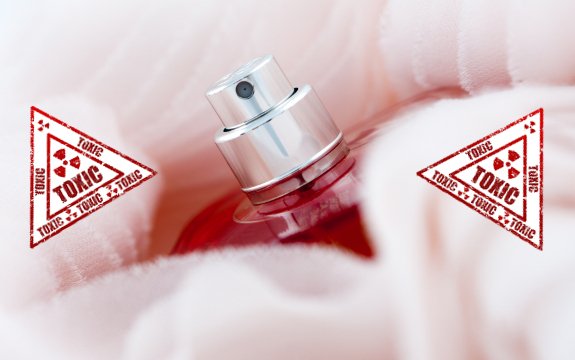Is Your Perfume Toxic?

 If you’ve ever been stuck in an elevator or tight space with someone wearing an overpowering scent, it may come as no surprise that perfumes may contain toxins. But it’s not only the ones that are unpleasing to your nose that could be dangerous—the sweet smelling ones may be too. If you wear anything that contains fragrances—shampoos, lotions, deodorants, and some oils—you could be absorbing these toxins directly into your skin.
If you’ve ever been stuck in an elevator or tight space with someone wearing an overpowering scent, it may come as no surprise that perfumes may contain toxins. But it’s not only the ones that are unpleasing to your nose that could be dangerous—the sweet smelling ones may be too. If you wear anything that contains fragrances—shampoos, lotions, deodorants, and some oils—you could be absorbing these toxins directly into your skin.
Fragrances, whether in your perfume bottle or your lotion, are essentially unregulated chemicals, many of them harmful. These toxins have been linked to respiratory complications, hormone disruption, allergies, and even cancer. They are loosely regulated, if controlled at all, and most people don’t know a lot about them, putting themselves at considerable risk.
The Environmental Working Group (EWG) defines fragrances as, “an undisclosed mixture of various scent chemicals and ingredients used as fragrance dispersants such as diethyl phthalate.” They go on to say, “Fragrance mixes have been associated with allergies, dermatitis, respiratory distress and potential effects on the reproductive system.”
In essence, “fragrance” on a product’s ingredient label is a way for the manufacturer to include a whole group of unlisted ingredients under the umbrella. As Mercola reports, laboratory tests analyzed by EWG in the past revealed some 38 chemical ingredients not listed on the labels of 17 different perfumes and colognes tested. Among these were ingredients associated with hormone disruption and allergic reactions, and those that had not been tested for safety at all.
Read: 6 Toxic Products to Eliminate from Your Home
According to EWG:
“An analysis of the chemical contents of products reveals that the innocuous-looking ‘fragrance’ often contains chemicals linked to negative health effects. Phthalates, used to make fragrances last longer, are associated [with] damage to the male reproductive system, and artificial musks accumulate in our bodies and can be found in breast milk. Some artificial musks are even linked to cancer.
And if you’ve got asthma, watch out — fragrance formulas are considered to be among the top 5 known allergens, and can trigger asthma attacks.
The same kinds of chemicals are often used for fragrances in cleaning products, scented candles, and air fresheners. To avoid those unpleasant side effects, choose fragrance-free products, but beware labels that say ‘unscented.’ It may only mean that the manufacturer has added yet another fragrance to mask the original odor.”
So, how are these things making it into the pretty bottles and onto your skin? Well, the fragrance industry is allowed to police itself. The very people making these scents are in charge of determining their safety. See the problem?
Parabens, phthalates, and synthetic musks are just some of the toxins you could be wearing on a daily basis in an effort to smell nice. The fact is, though, you don’t need them. Not only should bathing be good enough for a pleasant smell, there are plenty of natural scents out there.
Essential oils are a great way to smell good and you can even add them to your unscented lotions and bath oils, developing your own custom scent without all of the risks.
Additional Sources:
